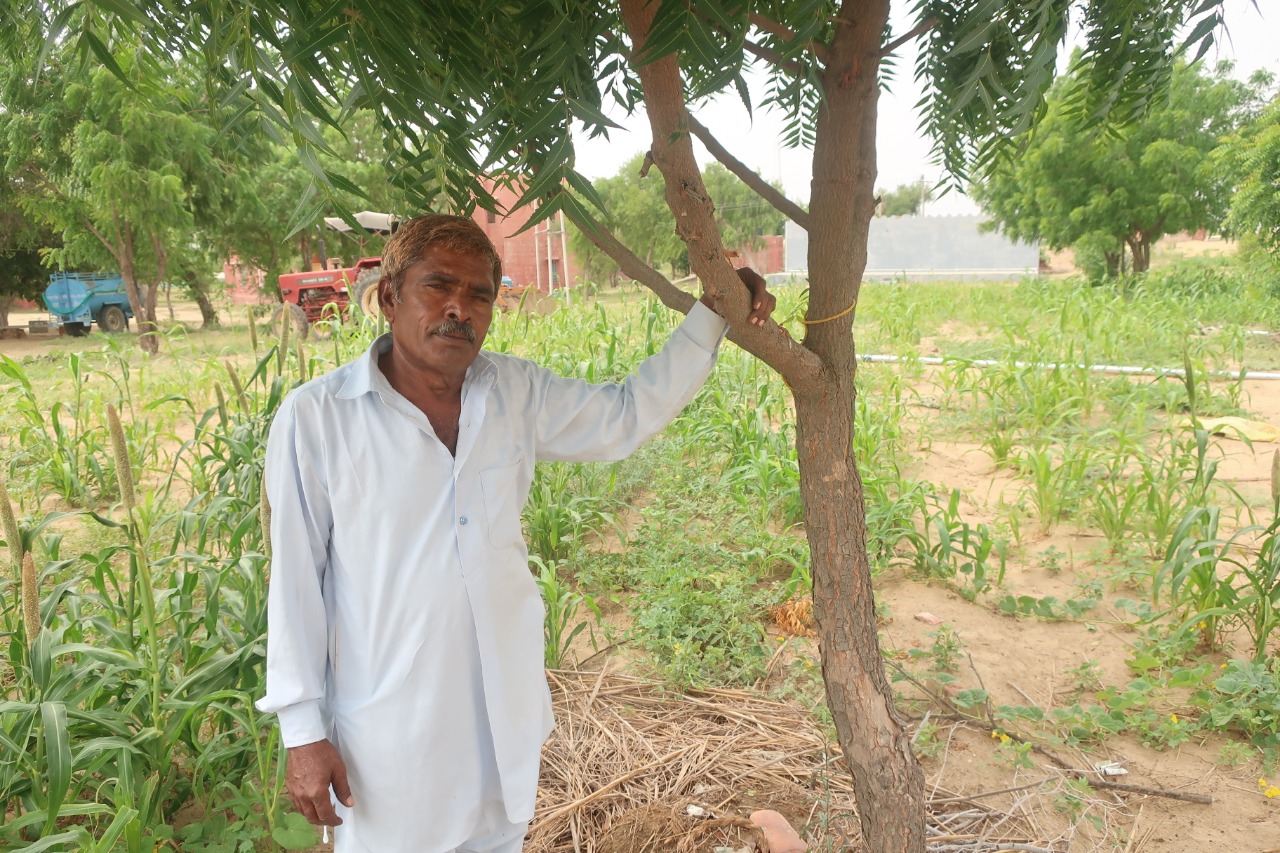Rajasthan Tractor Driver Turns Organic Farmer in The Thar Desert, Earns 50% More!
"I see farmers are spoiling their fields with all sorts of chemical poison. But once I introduced them to organic farming, their profits have spruced up by up to 50%."

It’s almost winter in India, and yet the daytime temperature continues to soar in the border village of Bajju in Rajasthan.
Located in the arid Thar Desert, this little hamlet remains sparsely populated, owing to the water scarcity and diurnally fluctuating temperature. Greenery is quite a rare sight amid the golden sand dunes, only occasionally interspersed with thistles and thorny hedges.
Kick breakfast up a notch with this luscious, 100% organic fig spread!
Even in such dry and desolate premises, Mahavir Singh has achieved the impossible. Since 2014, he has been practising organic farming in around 5.2 acres of land and also inspired around 50 fellow villagers to follow suit.
Mahavir has been trained and guided by Urmul Seemant Samiti, a non-profit organisation improving rural livelihoods in Bikaner and Jodhpur, since 1991.
A former tractor driver with Urmul, Mahavir would plough the fields of small-scale farmers in the villages around Bajju, who could not afford a tractor or even plough cattle of their own. “The womenfolk would ask me to plough their fields before the sowing season. I also had a small farm to myself alongside,” he recounts.
It was on his farm that tragedy struck him. With little knowledge about the adverse effects of chemical fertilisers or pesticides, Mahavir used to use these abundantly in his own farm where he grew groundnuts and cotton.
One day, while spraying pesticide on his crops, some of it spilt on his bare skin and scalded the area. “I was rushed to the hospital, but the pain was unbearable. I was shocked to realise that these are the chemicals we are adding to our crops, that we eat so nonchalantly. We hardly know what harm it is causing inside our body.”
Soon afterwards, Mahavir started advocating against chemical farming, telling his fellow farmers to refrain from putting ‘Zeher’ (poison) in their food. It was at such a juncture that Sunil Lahri, the project director of Urmul, urged Mahavir to take up organic farming himself.

This was also the time when Prashant Jangir, an MBA student from the Institute of Rural Management Anand (IRMA), who was working with Urmul as a part of his field project, came across Mahavir Singh and decided to share his inspiring journey through a video.
“These terrains are one of the toughest in India in terms of earning a livelihood. Being located near the Indo-Pak border, the region has remained an underdeveloped border area. Even in such conditions, Mahavir Singh’s extraordinary efforts deserve praise,” says Prashant.
Urmul Seemant Samiti’s campus extends over 10 acres, out of which there were around 5.2 acres of fallow land available for farming.
Over the past four years, Mahavir has diligently put every inch of this land to some use or the other, and even though he had little idea about the nitty-gritty of organic farming, he sincerely followed every instruction imparted to him by Urmul experts.
“I dropped out of school after Class 2, so I am not literate, but I memorised everything they told me and implemented it on the field. Now I prepare my own vermicompost, 100% natural pesticide and weedicide and monitor the entire organic farm at Urmul.”
Needless to mention, water scarcity was a primary drawback, but Mahavir combatted the water woes in the best way possible—through rainwater harvesting.
The area barely gets drenched once every three years, and even then the rains last for only three months from July to September. Mahavir makes use of every drop of rainwater which is cautiously collected in his massive tank, powered by solar energy. The stored water is channelled across the farm through drip irrigation.

Mahavir grows a diverse range of vegetables, fruits, seed grains and leafy greens in his farm. While basic cereals like Wheat, Bajra (pearl millet), Jawar (millet), paddy generate the substantial chunk of the profits, pulses like Moong (green gram) and Moth (kidney beans) also give a good harvest.
“I also grow fruits like mulberry, kinnow, lemon and amla. I even grow Moringa. Do you know how healthy its leaves are?” asks Mahavir. He has also invested in Azolla farming which provides an excellent sowing mixture for all other crops, aside from serving as fresh fodder for cattle.
Only recently, Mahavir has welcomed six cows to his farm to venture into the premise of dairy farming. Even in the desert, there is no shortage of green fodder for the cattle, thanks to his innovative organic farming methods.
The zealous farmer painstakingly procures his own natural pesticide—a precise concoction of neem leaves, crushed garlic, green chilli, tobacco extract and some gomutra (cow urine). He prepares the mixture in bulk throughout the entire day, which is then applied to the crops.
In his leisure time, Mahavir also provides hands-on lessons about organic farming to local school kids. “It is about inculcating the practice. If these kids plant a few trees here and there, that is also beneficial in every way,” he asserts.

“I see farmers are spoiling their fields with all sorts of chemical poison. But once I introduced them to organic farming, their profits have spruced up by up to 50%. The concept of organic farming is rapidly catching up in our area,” he shares.
Speaking to The Better India, Sunil Lahri, the Project Director of Urmul says, “Mahavir Singh has become the messenger of the organic farming bandwagon in and around Bajju. He is an inspiration for local farmers. So far, he has successfully convinced over fifty of them to opt for the organic way of agriculture. And they are reaping profits ever since!”
(Edited by Gayatri Mishra)
Like this story? Or have something to share?
Write to us: [email protected]
Connect with us on Facebook and Twitter.
If you found our stories insightful, informative, or even just enjoyable, we invite you to consider making a voluntary payment to support the work we do at The Better India. Your contribution helps us continue producing quality content that educates, inspires, and drives positive change.
Choose one of the payment options below for your contribution-
By paying for the stories you value, you directly contribute to sustaining our efforts focused on making a difference in the world. Together, let’s ensure that impactful stories continue to be told and shared, enriching lives and communities alike.
Thank you for your support. Here are some frequently asked questions you might find helpful to know why you are contributing?


This story made me
-
97
-
121
-
89
-
167











